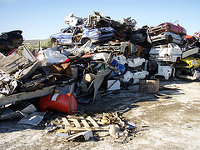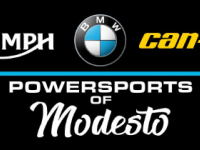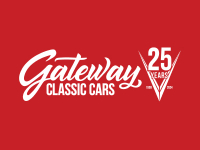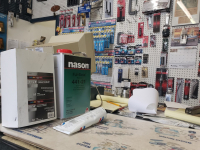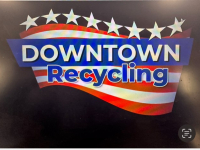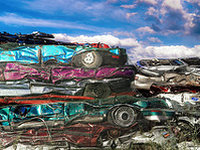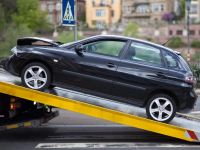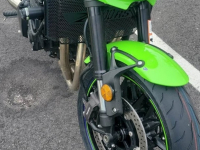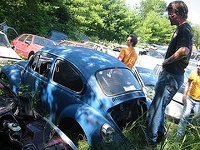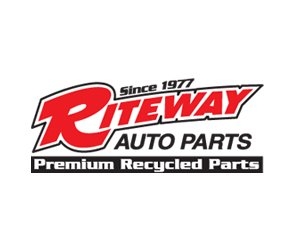JunkYards Near Me
Fast Search Engine
This page offers a search engine for all the junkyards near you in our directory, fast and just a few clicks away. Just enter below an address, a ZIP code or a city name and it will show you in seconds all the nearby auto salvage yards in which you can find the best used parts at the lowest prices. Also click on the "My location" button to instantly get all the businesses near your location, sorted by distance. In addition, we provide you the option to filter only the companies that are open at this time.
QUICK TIPFinding the best junkyards near your location.
Finding a trustworthy auto junkyard where to buy second hand components for your vehicle at the lowest price without waiving the corresponding warranty is not always an easy task. Under these lines we provide you a list so that you can browse the different states of the U.S. and Canada, and check which salvage yards are available near you right now. We are aimed to deliver you the most verified and truthful information on these businesses, but if you find a mistake please contact us and we will check it as soon as possible.
Junkyards in USA States
» Search junkyards in USA by State.
Junkyards in Canada Provinces
» Locate junkyards in Canada by Province.
If you're thinking about getting rid of your car to a junkyard, you have a few options to pick from.
- Get a fair price immediately by calling 1-833-693-5944 or completing our easy online form. We'll have the salvage yards competing for your vehicle, so you can receive the top dollar value possible.
- Increase the price of your junk car by selling your parts separately through a classified listing. Create an advertisement to unleash your full possibility and get the best of reaching potential customers interested in certain components.
- Take a look at the list of auto salvage yards close to you and contact them on your own.
Find auto parts near me
Saving a few dollars in these times is something we can not miss, right? For many, going to an official car dealership to buy parts for their vehicle is not a viable option, as these are usually expensive. In my case I prefer to go to a junkyard near me, where it's possible to find what I'm looking for at much lower prices and with warranty.
Sell your junk car with us
If you have an old car in the garage that no longer works and whose repair seems too expensive, you may be losing money! Many users and salvage yards will be happy to buy your vehicle for the parts, paying you in return a good money. In our site you have both the option to sell your car by parts to other users or to contact a junkyard near you and get a cash quote.
Buy a junk car
The junk car market has grown very quickly in recent years, especially due to the economic crisis. Not everyone can change his car every 4-5 years and the option of the parts market is increasingly interesting. In our website we want to contribute a little and we give you the possibility to check the cars and the parts that our users have for sale, totally free.
Recently featured junkyardsThe most popular according to our visitors.
There are many and very good junkyards on our website and from here we suggest that you take advantage of the JUNKYARDS NEAR ME SEARCH ENGINE or browse through the listings to find the nearest local businesses. Additionally, you can find below this paragraph the Recently Featured Salvage Yards Near You listing, which stand out for the quality of the used vehicle parts they sell, the warranty they offer and the customer service they deliver.
3D Auto-Parts & Salvage
10139 E County Road A, Janesville, WI 53546
open now
Gateway Classic Cars
1237 Central Park Dr., O Fallon, IL 62269
open now
Wellington Auto Parts / Auto Plus
123 E Herrick Ave, Wellington, OH 44090
5/5 - 5 reviews open now
Smart Auto Recycling
706 Strathearne Ave, Hamilton, ON L8H 7N8
open now
Pro Class Cycles
3800 N Hopkins Rd, Richmond, VA 23224
4.8/5 - 5 reviews open now
Hall’s Auto & Truck Parts Ltd.
55551 Range Rd 213, Fort Saskatchewan, AB T8L 4A8
1.5/5 - 6 reviews open now
RiteWay Auto Parts
320 S 27th Ave, Phoenix, AZ 85009
4.2/5 - 7 reviews open now
Frequently Asked QuestionsRelated to United States salvage yards or used auto parts.
What is a junkyard?
Junkyards, also known as "salvage yards" or "wrecking yards" are the places to which vehicles out of service are taken. There are businesses specialized in motorcycles, boats, airplanes, etc, but most of the junk yards we can find are for cars and trucks. These salvage yards usually operate locally, being the final destination of cars that are towed outside the accident site or where they stopped working.
Do junkyards buy parts?
On some occasions deposits can also buy broken down vehicles from insurance companies, owners or the same cities where the vehicles are towed. They dismantle the vehicles that buy or acquire and save the usable parts that were in good condition or that were still functional and can be used by cars of the same manufacturer or similar. Unusable metal parts are discarded or sold to companies that are responsible for recycling metals.
What are the most common types of parts that can be found in a Jjnkyard?
- Engine Components: Junkyards often have engines and their components, such as cylinder heads, engine blocks, camshafts, and pistons, salvaged from various vehicles.
- Transmissions: You can find automatic and manual transmissions, as well as transmission parts like torque converters and transmission control modules.
- Body Panels: Doors, hoods, fenders, bumpers, and trunk lids are commonly available for replacement or repair.
- Interior Parts: Junkyards offer a wide array of interior components, including seats, dashboards, consoles, steering wheels, and carpeting.
- Electrical Systems: You can source electrical parts like alternators, starters, batteries, ignition switches, and wiring harnesses.
- Suspension Components: Junkyards have suspension parts such as shocks, struts, control arms, and springs for improving ride quality.
- Braking Systems: Brake calipers, rotors, pads, drums, and brake lines can be found for brake system repairs.
- Exhaust Systems: Mufflers, catalytic converters, exhaust pipes, and oxygen sensors are often available.
- Tires and Wheels: You may discover used tires with decent tread and various types of wheels, including steel and alloy rims.
- Cooling and Heating Components: Radiators, heaters, cooling fans, and thermostat housings are commonly stocked for temperature control.
- Glass: Windows, windshields, and mirrors can be found, although they should be carefully inspected for cracks and damage.
- Lights and Lamps: Headlights, taillights, turn signals, and interior lighting fixtures are frequently available.
- Fuel System Parts: Fuel pumps, fuel tanks, injectors, and filters are often on hand for fuel system repairs.
- Accessories: You might stumble upon accessories like radios, GPS units, and aftermarket parts such as spoilers and body kits.
- Fasteners and Hardware: Nuts, bolts, screws, clips, and various hardware items can be valuable for various repairs.
Remember that the availability and condition of parts in a junkyard can vary widely. It's essential to inspect parts closely, check compatibility with your vehicle, and consult with the yard's staff for assistance in locating specific components. Additionally, always prioritize safety when navigating and exploring a junkyard environment.
Are the parts from salvage yards reliable?
Yes, many salvage yards thoroughly inspect and test parts before selling them, ensuring their reliability.
Does my car need a salvage title for a junkyard to buy it?
The process to give a salvage title is started by insurers when they inspect the car after an accident and they determine that they have damages that exceed 70% of the value of the car, so they declare it as a total loss. Then, the state vehicle agency issues the salvage certificate, which indicates that it cannot be driven unless it is repaired. This title at no time is responsible for giving certain privileges of car sales in a junk yard.
How much can I get for a junk car?
If you want to sell a car in a junkyard the value that is offered to you will depend on several factors, starting with the deposit you are going to offer it to and the details and characteristics of your car: year of manufacture, severity of damage received, damage to the most valuable pieces, etc. You must have all these factors in mind and very present so that they do not try to pay you much less than you could actually receive for the car.
How do I sell my car to a junkyard?
There is some documentation that must be submitted when you want to sell a car to a junk yard: National ID Card, Data sheet, Traffic permit and Fees.
Do salvage yards offer towing services for my damaged vehicle?
Some junkyards offer towing services for a fee, while others may require you to arrange transportation.
How do junkyards determine my car's value?
As we briefly explain in a previous question, deposits usually buy cars that no other person would buy due to the damage they have. But many people are left in doubt of how much they will pay for their car and how they determine the value of the car.
It is important that you keep in mind that in this aspect a subjective response can be given, since factors such as the age, the model of the car, its brand, its state, the state of the pieces, etc, come into play. The truth is that until a few years ago it was really complicated to be able to buy the price offered by each deposit, since they had to go to each of them, so that they could determine the condition of the car and its parts. Or, that someone from the warehouse moved to the place where the car is located.
Fortunately, today there are different alternatives to be able to price a car online and very quickly and easily. Even in some cases this can be done by WhatsApp, although it is clear that this may have certain disadvantages in terms of reliability and safety.
To get a clearer idea of what a deposit pays for a car you can visit the deposit website and enter some of the most important information about the car in question. It will also be necessary to send some pictures of the different parts of the car so that the people in the warehouse have a clearer idea about their status. Once this is done, the deposit will contact you and give you an offer with the value of the car.
In any case, you will always be able to get an approximate idea of the market price of your vehicle and this will correspond with relative precision to the price that you will finally be offered. There are a number of online tools (some of them free) that will give you the information you may need on the approximate market value of your car, such as Edmunds or Kelley Blue Book.
Are there any environmental benefits to using salvage yard parts?
Of course, using recycled auto parts helps reduce waste and conserves resources, making it environmentally friendly.
Should I buy a salvage car?
This can be a good option to buy a car at a better price. However, it is important that you consider certain key points to make sure you are making a good purchase.
First, you must verify that the agency that invoices the sale corresponds to the data of the unit, in addition to that the original documents of the vehicle must be requested. On the other hand, it is also advisable to check if the car has been in a robbery investigation process and if so, that the case has already been regularized and terminated.
Finally, take care of validating the proper functioning of the car with a certified expert or a trusted person with knowledge that helps you to verify that the car you are buying is in a good condition.
On the other hand, do not forget that by buying a junk vehicle you help the environment, since you reuse materials that could have been harmful to the environment if they are not treated correctly.
What tools should I take to a junkyard?
It is important that you take the correct tools with you the day you visit the salvage yard, otherwise you may be left without getting an used part of your interest. As experts in general car mechanics, we recommend that you bring:
- Pliers
- Ratchets
- Wrenches
- Sawsall
- Screw drivers
- Hammer
- Impact driver
- Extensions
- Sockets SAE and Metric
- Breaker bar
- Penetrating Fluid
How do I ensure I'm getting the correct part for my vehicle?
It's crucial to provide accurate information about your vehicle's make, model, year, and VIN (Vehicle Identification Number) to the salvage yard to ensure you receive the correct part.
Can the salvage yard ask me for an entry fee?
Some junkyards may require you to pay a small entrance fee (usually no more than $10) in order to enter their facilities. With this money they can cover their administrative and maintenance costs and ensure that they receive customers who are truly interested in parts.
Can I find rare or vintage car parts at salvage yards?
Yes, auto junkyards often have a wide variety of vehicles, including rare and vintage models, which can yield unique parts.
What is the average price of junk parts in the United States?
The average price of junk parts in the United States can vary significantly depending on several factors, including the type of part, its condition, demand, and the location of the salvage yard. However, I can provide a general overview of what you might expect:
- Common Parts: Basic parts like body panels, interior components, and some engine or transmission parts from common vehicles can be relatively affordable. Prices for these parts may range from $20 to a few hundred dollars, on average.
- Specialty Parts: Parts that are less common or specific to certain makes and models can be more expensive. These might include rare engine components, high-performance parts, or specialized electronics. Prices for specialty parts can vary widely but may range from a few hundred to several thousand dollars.
- Condition: The condition of the part is a significant factor in pricing. Salvage yards typically categorize parts as new, used, rebuilt, or remanufactured. New or rebuilt parts are generally more expensive than used ones.
- Demand: Parts in high demand, such as airbags or catalytic converters, tend to be priced higher due to their scarcity and the need for safety or emissions compliance.
- Location: Prices can also vary by region. Salvage yards in areas with a high cost of living may charge more for parts than those in less expensive regions.
- Negotiation: Some salvage yards are open to negotiation, especially if you're buying multiple parts or if the part has been in their inventory for a while.
- Online Marketplaces: Online marketplaces like eBay and Craigslist can also influence pricing. You might find competitive prices, but be sure to factor in shipping costs.
It's essential to shop around, compare prices, and consider factors like the part's condition and warranty when buying from a salvage yard. Additionally, keep in mind that some parts, especially safety-related ones, may be better to purchase new to ensure they meet safety standards.
To get the most accurate pricing information, it's a good practice to contact local salvage yards using our Fast Search Engine that will allow you to search for specific parts and compare prices.
Is it possible to negotiate with a salvage yard for the prices of the parts?
It is normal to find prices already fixed for the most basic parts of the vehicle, such as transmissions, mirrors, alternators... In these cases, the negotiation is going to be quite difficult. However, regular customers of the junkyard or those who buy several pieces at the same time can get some discounts if they try to bargain.
What is the origin of the vehicles that are usually found in salvage yards?
Junkyards usually gather vehicles from the most diverse origins, in some cases you will be surprised:
- Vehicle auctions
- General owners who want to dispose of their vehicle
- Cars from accidents sent by insurance companies
- Police impounds
- Businesses that cease their activity
How does a junkyard search engine work?
A junkyard search engine is an online tool that allows users to search for replacement parts at salvage yards or recycling centers.
These specialized search engines work as follows:
- Users enter search criteria such as the year, make and model of the vehicle for which they need the replacement part.
- The search engine searches a database of spare parts available from different salvage yards and recycling shops.
- The database is regularly fed with information from salvage yards and recycling shops, including the spare part description, price and location.
- Once the search engine finds spare parts that meet the search criteria, users are presented with a list of results with relevant information such as make, model, location, and description of the part.
- Users can select the spare part of their choice and contact the junkyard or recycling shop for more information or to make the purchase.
It is important to note that salvage search engines only facilitate the search for junk parts and do not handle the sale or delivery of used parts. Users must contact the salvage yard or recycling workshop directly to make the purchase and coordinate the delivery of the spare part.

